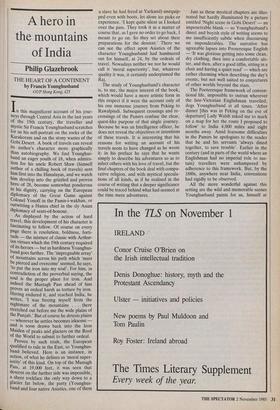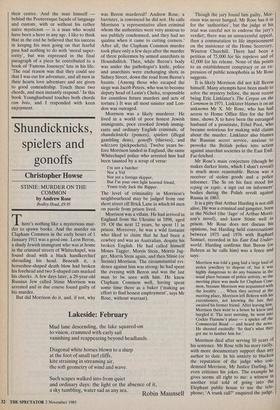A hero in the mountains of India
Philip Glazebrook
THE HEART OF A CONTINENT by Francis Younghusband
OUP Hong Kong, £25
In this magnificent account of his jour- neys through Central Asia in the last years of the 19th century, the traveller and mystic Sir Francis Younghusband scratches for us his self-portrait on the rocks of the Karakoram and on the stony wastes of the Gobi Desert. A book of travels can reveal its author's character more graphically than autobiography. We find Younghus- band an eager youth of 18, when admira- tion for his uncle Robert Shaw (himself author of a chilling book of travels) sent him first into the Himalayas, and we watch him develop into the grizzled and proven hero of 28, become somewhat ponderous in his dignity, carrying on the European diplomacy of the Great Game against Colonel Yonoff in the Pamir-i-wakhan, or outwitting a Hunza chief in the sly Asian diplomacy of seats-of-honour.
As displayed by the action of hard travel, this development of his character is fascinating to follow. Of course on every page there is resolution, boldness, forti- tude — the mixture of classic with Arthur- ian virtues which the 19th century required of its heroes — but in hardiness Younghus- band goes further. The 'impregnable array' of mountains across his path which 'must be pierced and overcome' seemed, he says, to put the iron into my soul'. For him, in contradiction of the proverbial saying, the soul is the proper place for iron. And indeed the Mustagh Pass ahead of him proves an ordeal harsh as torture by iron. Having endured it, and reached India, he writes, 'I was freeing myself from the nightmare of the mountains . . . there stretched out before me the wide plains of the Punjab.' But of course he detests plains — wherever he settles becomes irksome and is soon drawn back into the Iron Maiden of peaks and glaciers on the Roof of the World to submit to further ordeal.
Proven by such trials, the European qualified to rule in the East, so Younghus- band believed. Here is an instance, in action, of what he defines as 'moral super- iority' of this kind. On top of the Mustagh Pass, at 19,000 feet, it was seen that descent on the further side was impossible, a sheer rockface the only way down to a glacier far below, the party (Younghus- band and four native Asiatics, one of them a slave he had freed at Yarkand) unequip- ped even with boots, let alone ice picks or experience. 'I kept quite silent as I looked over the pass. They took it as a matter of course that, as I gave no order to go back, I meant to go on. So they set about their preparations for the descent.' There we can see the effect upon Asiatics of the character Younghusband had hamMered out for himself, at 24, by the ordeals of travel. Nowadays neither we nor he would call it 'moral superiority', but, whatever quality it was, it certainly underpinned the Raj.
The study of Younghusband's character is, to me, the major interest of the book, which would have a more artistic form in this respect if it were the account only of his one immense journey from Peking to Rawalpindi. Subsequent crossings and re- crossings of the Pamirs confuse the clear, quest-like purpose of that single journey. Because he was an Intelligence officer, he does not reveal the objectives or intentions of these travels. It is interesting that his reasons for writing an account of his travels seem to have changed as he wrote it: in his preface he says that he wants simply to describe his adventures so as to infect others with his love of travel, but the final chapters of the book deal with compa- rative religion, and with mystical specula- tions of all kinds, as if he realised in the course of writing that a deeper significance could be traced behind what had seemed at the time mere adventures. Just as these mystical chapters are illus- trated but hardly illuminated by a picture entitled 'Night scene in Gobi Desert' — an impenetrable blank — so Younghusband's direct and boyish style of writing seems to me insufficiently subtle when discoursing on imponderables. The narrative has agreeable lapses into Pooteresque English — 'It was glorious getting into some clean, dry clothing, then into a comfortable uls- ter, and then, after a good tiffin, sitting in a chair and having a quiet read' — which are rather charming when describing the day's events, but not well suited to conjectures of other worlds beyond the stars.
The Pooteresque framework of conven- tional life, impossible to outrun wherever the late-Victorian Englishman travelled, dogs Younghusband at all times. 'After dinner [this was in Peking on the eve of departure] Lady Walsh asked me to mark on a map for her the route I proposed to follow' to India 4,000 miles and eight months away. Amid fearsome difficulties in the Pamirs he apologises to the reader that he and his servants 'always dined together, to save trouble'. Earlier in the century (and in parts of the world where an Englishman had no imperial role to sus- tain) travellers were unhampered by adherence to this framework. But, by the 1880s, anywhere near India, conventions had rigidly to be observed.
All the more wonderful against this setting are the wild and memorable scenes Younghusband paints for us, himself at their centre. And the man himself behind the Pooteresque fagade of language and custom, with or without his rather naive mysticism — is a man who would have been a hero in any age. I like to think that in the end he believed that his success in keepng his men going on that fearful pass had nothing to do with 'moral super, iority', but was expressed in the final paragraph of a piece he contributed to a book of 'Famous Journeys' late in his life: `The real reason was that they could see that I was out for adventure, and all men in their hearts love adventure and are given to good comradeship. Touch these two chords, and men instantly respond.' In this book Younghusband touches both chords con brio, and I responded with keen enjoyment.























































 Previous page
Previous page